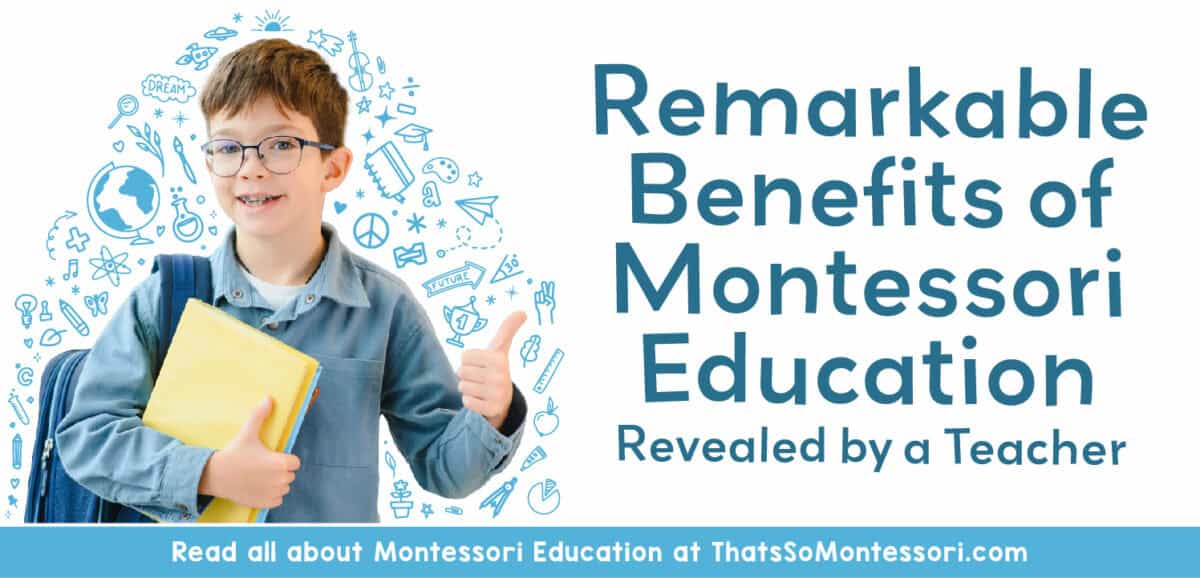15 Remarkable Benefits of Montessori Education Revealed by a Teacher
As someone who’s taught in both an elementary Montessori classroom and an elementary traditional school environment, I’ve seen the incredible benefits of Montessori education for children in the second plane of development.
Before we get into the benefits of Montessori, it’s important to know that a Montessori education is not your typical school experience. It’s a unique approach that truly transforms how children learn and grow.
As we explore the benefits of Montessori, you’ll notice a difference between Montessori and traditional schools. Montessori classrooms offer students freedom within a structured framework, preparing them for life outside of the classroom walls.
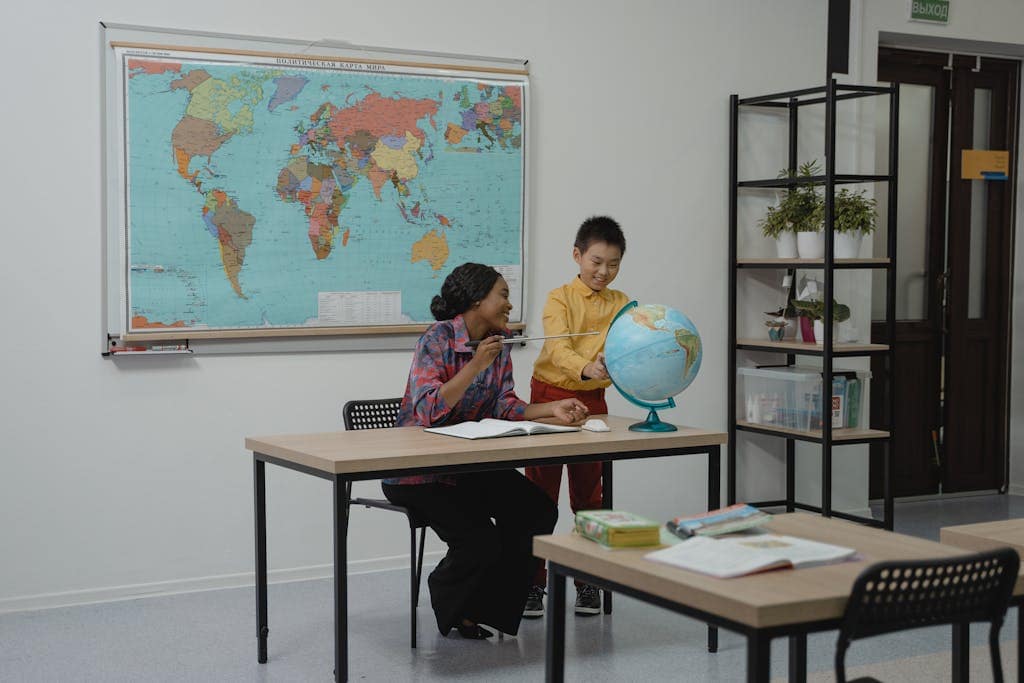
15 Benefits of Montessori Education
Montessori education isn’t just about teaching; it’s about creating an environment where children can truly thrive and flourish. Here are several ways Montessori education benefits young learners and sets them up for success in all areas of life.
1. Individualized Education
Montessori classrooms personalize learning experiences to fit each child’s unique pace, interests, and abilities. This approach allows children to explore subjects they find fascinating, while also providing additional support in areas where they may need more assistance.
From my experience in the classroom, I’ve seen how Montessori’s personalized approach to education truly fosters a sense of mastery and accomplishment in students. It builds their confidence and nurtures a lifelong love for learning.

2. Immersive Hands-On Learning
Montessori education emphasizes hands-on experiences, where children actively engage with materials and interesting activities to explore concepts. As a result, this tactile approach not only enhances understanding but also fosters a deeper connection to the subject matter.
In my years of teaching upper elementary students, I’ve witnessed how hands-on materials in the Montessori classroom help children develop critical thinking and problem-solving skills. This approach goes far beyond rote memorization, giving them a solid foundation of knowledge they carry with them into every aspect of their learning.

3. Social Bonds and Leadership Skills
The collaborative learning environment of a Montessori classroom allows children to interact with peers across different ages. This setup fosters realistic social experiences where younger children learn from older peers and older children develop leadership skills by mentoring younger ones.
I’ve observed that in a Montessori classroom group activities help children become natural leaders. They learn to communicate, solve problems as a team, and navigate social dynamics, all while building empathy and cooperation. These experiences prepare them for life beyond the classroom, shaping them into confident, compassionate leaders.
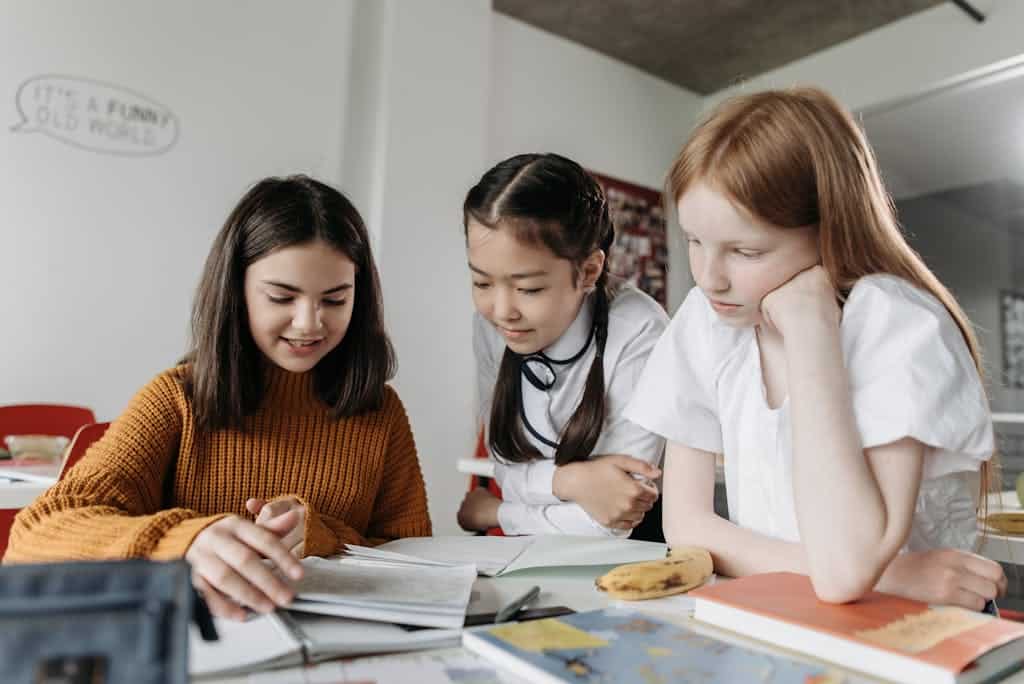
4. Lifelong Love for Learning
One of the standout benefits of Montessori education is its ability to foster a lifelong love for learning. By encouraging children to pursue their own interests and work at their own pace, Montessori classrooms nurture an intrinsic motivation that makes learning an exciting and personal journey.
This approach helps students develop a genuine curiosity about the world around them, which often extends beyond the classroom and continues into their adult lives. The emphasis on self-directed activities and hands-on exploration lays a strong foundation for a love of learning that persists throughout their educational experiences.

5. Freedom with Limitations
In Montessori classrooms, elementary-aged children are encouraged to explore and learn independently, guided by their own interests. This environment balances freedom with the responsibility to adhere to classroom guidelines, deadlines, and expectations.
This approach nurtures independence, self-discipline, and decision-making skills that extend far beyond the classroom. By creating an environment where children can steer their own learning, Montessori education not only boosts academic growth but also equips students with the tools they need to tackle real-life challenges. As a teacher, I’ve witnessed these skills prepare kids for future successes, making them more confident and resilient individuals ready to handle whatever comes their way.
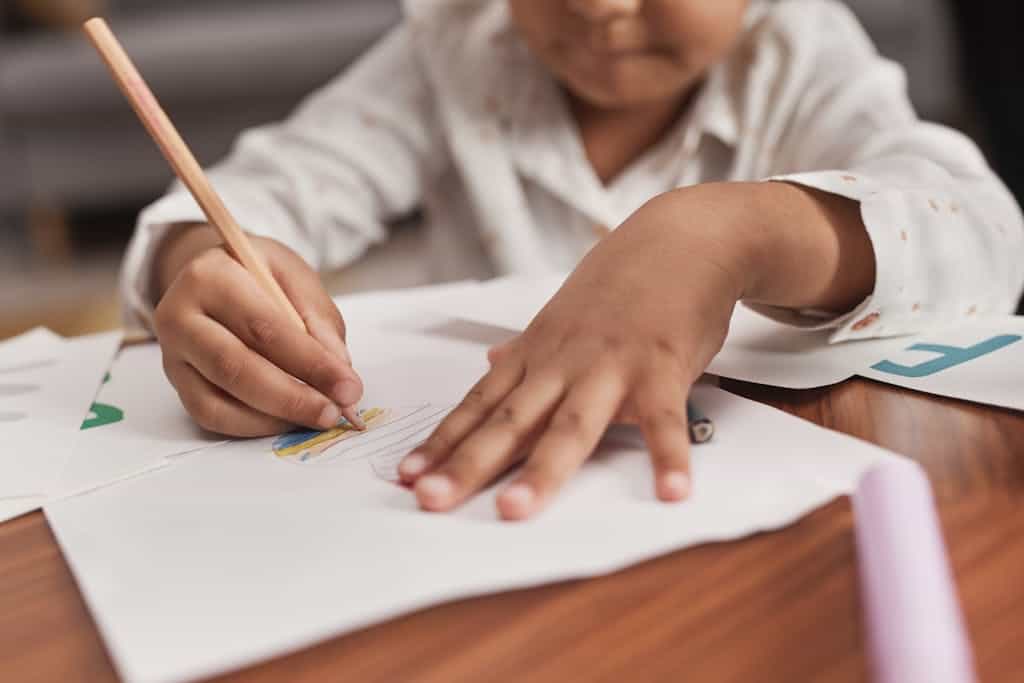
6. Flexible Learning Environment
Montessori classrooms offer a flexible and adaptable learning environment that encourages creativity, innovation, and exploration. Children are encouraged to follow their interests and pursue projects that inspire them, leading to a more organic and dynamic learning experience.
In my classroom experience, I’ve seen how personalizing learning to each child’s strengths and interests makes a big difference. It helps keep them engaged and supports their success in a way that’s unique to them.

7. Real-World Preparation
Montessori education goes beyond academics to equip children with practical life skills, emotional intelligence, and adaptability, all while learning in disguise. Through activities such as cooking, gardening, and caring for the environment, children learn valuable life skills that prepare them for success in the real world.
In my years in the classroom, I’ve seen how these practical activities make a significant impact. When students take charge of their own learning through real-life tasks, they develop a deeper understanding of responsibility and self-reliance.

8. Fine Motor Skill Development
Fine motor skills are essential for a wide range of tasks, from writing and drawing to using tools effectively, thereby forming a fundamental basis for academic achievement.
In a Montessori environment, children engage with a diverse array of specialized hands-on materials designed specifically to enhance fine motor skills and hand-eye coordination. Through activities like sorting, manipulating small objects, and working with precision tools, students refine their movements, gaining control and dexterity that extend beyond the classroom into everyday life.
These skills not only support academic pursuits but also contribute to overall physical and cognitive development, preparing children for various challenges and opportunities they encounter as they grow.

9. Inclusivity for Diverse Needs
Montessori education shines in its ability to meet diverse learning needs and styles. With a flexible approach, Montessori classrooms allow students to learn in ways that best suit them. Whether through hands-on materials or self-directed activities, this method ensures that every child, regardless of their abilities, can engage meaningfully and make progress.
As a Montessori elementary teacher, I’ve witnessed firsthand how each child, with their unique learning style, can find success. For example, students who thrive on visual aids or hands-on activities can excel through tailored materials and activities, while those who need more verbal or social interaction benefit from group discussions and collaborative projects. It’s a win-win for every child!
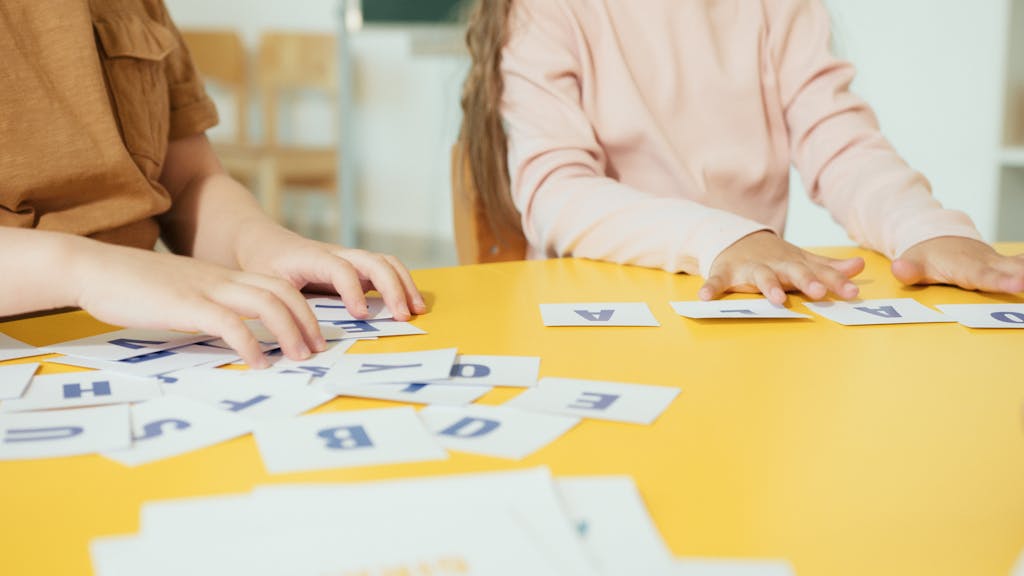
10. Empowers Self-Assessment and Improvement
Montessori encourages children to take ownership of their learning by fostering a culture of self-assessment and reflection. Children are encouraged to evaluate their own progress, identify areas for improvement, and set goals for growth.
This process of self-directed learning promotes independence, accountability, and a deeper understanding of concepts. By empowering children to take an active role in their education, Montessori creates valuable teachable moments that instill a lifelong habit of self-improvement and continuous learning.

11. Part of a Supportive Community Network
Montessori education often creates a strong sense of community among students, teachers, and parents, fostering a supportive network for all involved. Through collaborative projects, community events, and parent involvement, Montessori schools create a sense of belonging and connection that extends beyond the classroom.
This supportive network provides children with the encouragement, resources, and guidance they need to thrive academically, socially, and emotionally.
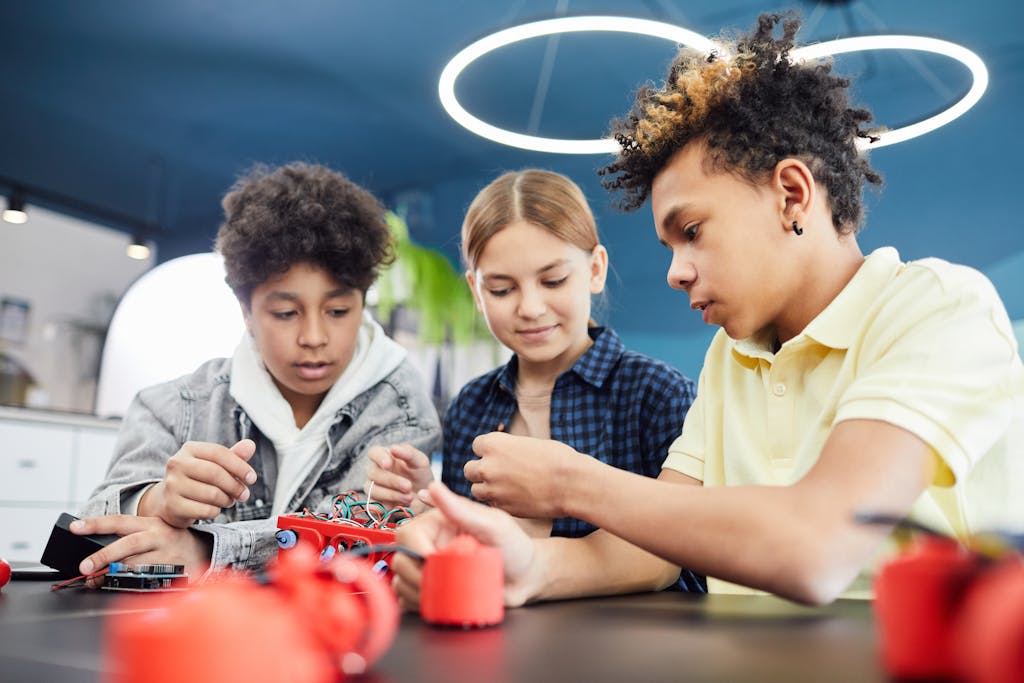
12. Holistic Development
In Montessori education, the focus extends beyond academic achievements to encompass the complete development of the child. Through carefully designed activities and experiences, Montessori promotes social skills, emotional intelligence, physical coordination, and cognitive abilities.
By addressing all aspects of development, Montessori fosters well-rounded individuals who are prepared to thrive in various aspects of life, not just academically.

13. Responsive Learning Environment
Montessori classrooms provide a nurturing atmosphere where children feel empowered to explore, experiment, and discover. Teachers act as guides, offering encouragement and guidance while allowing children the freedom to pursue their interests.
Through years of teaching, I’ve witnessed how this method ignites a genuine passion for learning. Seeing students eagerly delve into their interests and approach challenges with excitement underscores the effectiveness of fostering curiosity and independent thought.
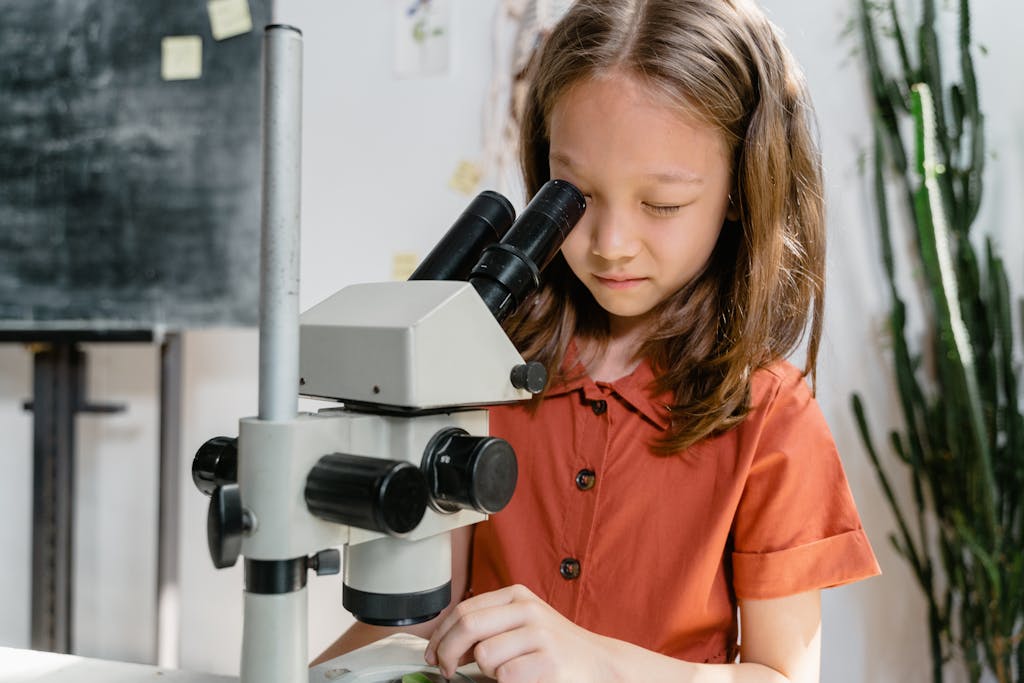
14. Mixed Age Groupings
Montessori classrooms typically feature mixed-age groupings, allowing children of different ages to learn and grow together. This arrangement creates a natural learning environment where older children serve as mentors and role models for younger ones, while younger children benefit from observing and learning from their older peers.
In my observation, children in mixed-age groups tend to develop essential social and emotional skills, such as empathy, communication, and conflict resolution, more naturally and effectively.

15. Self-Directed Learning
A key aspect of Montessori education is its focus on self-directed learning. Children have the freedom to choose their activities and work at their own pace, allowing them to explore their interests and passions. This autonomy fosters a sense of ownership over learning and encourages children to take initiative, make decisions, and problem-solve independently.
By engaging in self-directed learning, children develop essential skills such as self-discipline, time management, and goal-setting, preparing them for success in school and beyond.
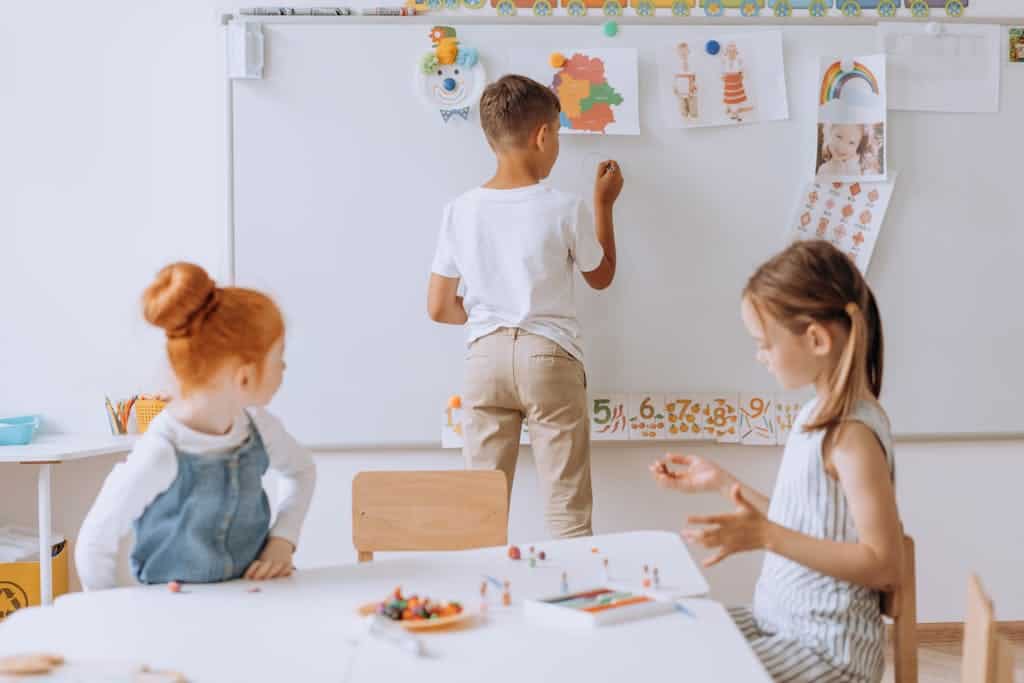
As you can see, there are many benefits to Montessori education at the elementary level. But it’s not a perfect system. Despite its strengths, it’s essential to acknowledge potential drawbacks of a Montessori education.
Disadvantages of Montessori Education
While Montessori education offers numerous advantages, it’s crucial to recognize that it might not be the perfect fit for everyone due to certain limitations.
Montessori education comes with a high price tag
One significant drawback of Montessori education is the cost. Private Montessori schools can be relatively expensive compared to traditional public schools, which are free, making it less accessible for some families.

Not all students thrive with extensive independence
While independence is a cornerstone of Montessori education, excessive freedom might not suit every student. Some children might struggle with self-direction, requiring more structured guidance than a Montessori classroom typically offers.
Not all Montessori schools run authentic Montessori programs
The effectiveness of Montessori education largely depends on how well the principles are implemented within each school. Not all institutions follow the Montessori approach with equal rigor or fidelity, leading to variations in the quality of education offered.
Despite its drawbacks, the extensive advantages of Montessori education outweigh its limitations. Conducting thorough research and exploring local Montessori schools can help determine if it’s an ideal fit for your child’s educational journey.

Finding a Montessori School Near You
Looking for a Montessori school for your elementary-aged child? We’ve got you covered!
In Canada
Discover the best Montessori schools through the Canadian Council of Montessori Administrators (CCMA). They have a comprehensive list of accredited schools to help you make an informed choice.
In the US
Check out the Association Montessori International’s school locator. It’s a fantastic resource to find top-rated Montessori schools in your area.
Beyond North America
A simple internet search for “Montessori schools near me” will lead you to great options in your region. Montessori education is embraced worldwide, so you’re sure to find a school that fits your needs.
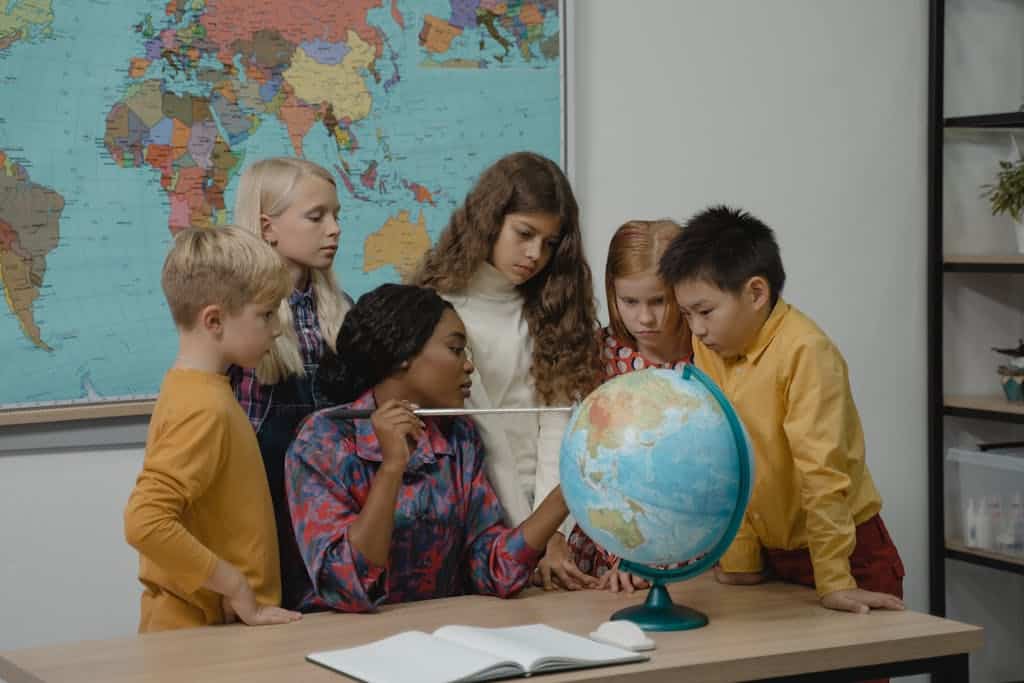
Do Your Homework
It’s crucial to do your due diligence when selecting a Montessori school for your kids. Take the time to read up on the schools in your area, speak with the administrators, and plan a visit. This will help you ensure that the school is a good fit for your child’s needs and educational journey.
The Wrap-Up: Benefits of Montessori
The benefits of Montessori education extend far beyond the classroom, laying a strong foundation for a child’s lifelong success.
By nurturing their innate curiosity, independence, and love for learning, Montessori empowers children to develop critical thinking skills, emotional intelligence, and a deep sense of responsibility. This holistic approach not only prepares students academically but also equips them with the tools needed to navigate the complexities of life.
Through personalized learning and a focus on the whole child, Montessori education fosters a lifelong passion for knowledge and personal growth, setting the stage for confident, capable, and well-rounded individuals.
Save this post for later by 📌 Pinning it to Pinterest

Keep your kids busy learning with the activities in these blogs:
11 Ways to Use Our Roll A Story Dice Game
57 Epic Montessori-Aligned Spring Break Activities for Your Kids
13 Engaging Vocabulary Development Activities for Elementary Kids
Rebus Puzzles for Kids: A Comprehensive Riddle-Solving Guide
9 Unique Rebus Puzzles with Answers for Kids
31 Fun Summer Reading Activities Elementary Students Will Love
The Best Neighborhood Walk Scavenger Hunt
8 Easy Rebus Puzzles with Answers
Score Big with These 9 Super Bowl Classroom Activities
27 Educational YouTube Channels to Prevent Summer Learning Loss


